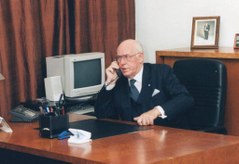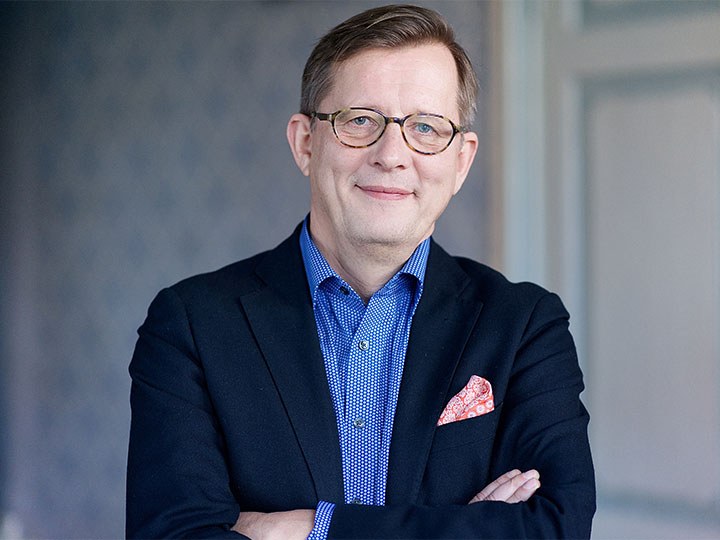Estonia and the Nordics – from aid to equal cooperation
At the Nordic Council of Ministers’ office in Tallinn, they will happily tell the story of how the Estonian President Lennart Meri regularly used to visit the information office in 1991.
 The President was happy to borrow the telephone in the Nordic office, as it was assumed the line in his own office was not secure. The Nordic office went online and connected to the rest of the world early on. This was new in the former Soviet Republic, which gained independence in August 1991.
The President was happy to borrow the telephone in the Nordic office, as it was assumed the line in his own office was not secure. The Nordic office went online and connected to the rest of the world early on. This was new in the former Soviet Republic, which gained independence in August 1991.
Christer Haglund is looking back on the Nordic Tallinn office’s 30-year history and the just over eight years he has been the Director there.
In the beginning, the Nordic cooperation with the Baltics centred on helping to build completely new institutions by providing Nordic examples via the three information offices in the three Baltic capitals and in St Petersburg.
“A brave decision”
"The Nordic governments made a brave decision when they established offices in the Baltics even before the countries had officially regained their independence,” says Haglund. Since then, their operation has expanded and the cooperation has become more equal.
To start with the Nordics provided help to Estonia, but for a long time now, the stated aim has been equal cooperation. This has increasingly been the case, says Christer Haglund.

Christer Haglund has led the Nordic Council of Ministers' information office in Tallinn for over eight years. Photo: Nordic Council of Ministers' Office in Estonia.
His job description has been to bring politicians, experts, business representatives and civil servants from the Nordics, Estonia and the other Baltic states together. The aim – promoting common interests within the framework of green growth, sustainable development, innovation as well as welfare, creative industries and culture. The idea is to use cooperation and networks to improve the Nordic-Baltic region’s global competitiveness.
Haglund underlines that these days, the Nordics also have a lot to learn from Estonia, especially when it comes to the IT sector. This is about both business and security policy.
A new threat from Russia
Still – and yet again – a lot is about Russia. When Haglund started his job at the Tallinn office, the Russian occupation of Crimea and parts of the Donbas had already happened.
Russian influence in Estonia is a recurring issue, especially after the Russian attack on Ukraine.
A small, temporary office was opened in Narva, Eastern Estonia, near the border with Russia. There was a desire to integrate the population in Narva better into the rest of the Estonian society – 95 per cent of people there are Russian speakers.
Only a small minority of them are considered to be supporting Kremlin. Still, there seems to be a palpable fear of them and of Russia. Estonia wants to strengthen the Estonian language, including in schools, and to weaken the position of the Russian language.
Much focus on the labour market early on
When the Tallinn office was new, a lot of its work centred on the labour market and private businesses. This has continued during Haglund’s time there.
Startup businesses have been a hot topic. Nordic experts have been called in to talk about how to set up and run startups, what to go for and where to be careful. Christer Haglund says there has been much progress.
 Markus Villig is the founder and CEO of the Estonian company Bolt, whose electric scooters can be found in several Nordic countries. It is one of Estonia's seven unicorns – companies that are valued at more than one billion euro. Photo: Diarmuid Greene/Web Summit
Markus Villig is the founder and CEO of the Estonian company Bolt, whose electric scooters can be found in several Nordic countries. It is one of Estonia's seven unicorns – companies that are valued at more than one billion euro. Photo: Diarmuid Greene/Web Summit
“Estonia now has the world’s biggest number of unicorns per capita – successful businesses that are extremely highly valued,” says Haglund. He mentions Bolt, Playtech and Transferwise. And Skype, which was both Swedish and Estonian before Microsoft bought it.
The welfare sector and migration
Some projects have been there from the start, mostly within the social sector.
“The welfare sector has always been a relevant issue and still is. For many years, we have been fighting human trafficking. New networks have made it easier for authorities to talk to each other. The problem is common in many countries and sadly still exists,” says Christer Haglund.
The Estonian authorities still want Nordic help with migration. The challenge has been that well-educated Estonians have been emigrating, and the population has fallen as a result. The issue and possible solutions to it have been studied at conferences and study visits.
Now, things have turned and the problem has changed. Estonia now has more refugees from Ukraine than the Nordic countries.
Domestic violence grew as a problem during the pandemic. It is a problem everywhere but perhaps more so in the Baltics than in the Nordics, says Christer Haglund.
During the pandemic, family relations frayed because people had to spend more time together while their economy also often suffered.
“You have to remember that social protection is not on the same level in Estonia as in our Nordic countries,” points out Christer Haglund.
Gender equality is a key issue for the Nordics
One theme that the Nordics have pushed in the Baltics is gender equality. The Nordic drive to increase paternal leave has not had that much success in Estonia.
The issue has not disappeared in the Baltics, it is particularly relevant because the wage gap between men and women in Estonia is one of the largest in the EU. But the gender distribution in companies and organisations seems reasonable, says Christer Haglund.
“There are still challenges. But after a few years, I noticed the same people at all the gender equality conferences and seminars, and things never ended in concrete decisions and measures,” says Haglund.
He wanted to focus directly on Estonian companies since they have the opportunity and freedom to make changes quickly if they see the benefit of it. And it is not difficult to demonstrate the benefits of gender equality so that it spreads throughout society.
Sustainability and recycling – tempting young people
Right now, there is a lot of emphasis on sustainability and recycling from the Nordics in Estonia. A lot has been done to break through to the most difficult target group – young men. Well-known Estonian actors and musicians have been used to make social media posts and TV reports, explains Christer Haglund.
The Nordic Swan Ecolabel is also being introduced in Estonia. The Swan is not only a Nordic brand, points out Haglund. He often describes the world of business as the engine for Nordic reforms, making sure things like the Swan Ecolabel become a reality faster than in many state organisations.
That is why it is important that both Estonian consumers and Nordic and Baltic businesses want to use the Swan Ecolabel. Investors also want things to be done well. Haglund is advocating the use of new channels and methods to spread the Nordic message.
“You have to get your message out in new ways so that people understand the benefits of this in these countries.”
Cyber safety put Estonia in the lead
One of the new areas of cooperation is cyber security, where Estonia is considered to have bypassed the Nordics – both in terms of electronic voting, digitalised bank services and uncovering illegal online meddling.
There is even a council of ministers for IT and digitalisation for both Nordic and Baltic ministers and civil servants. This is the only one of its kind and a very interesting phenomenon, thinks Christer Haglund.
He talks about a new successful project – a Nordic-Baltic cyber battle which is all about positive hacking. School students in the Baltics and Nordics compete against each other in order to get to the finals in Tartu. There, they get real-life challenges which they must solve.

Cyber Battle of Nordic-Baltics is held together with Cyber Battle of Estonia. The two competitions aim to raise awareness among young people about cyber security. A video about the event can be seen here:
The cyber battle, which is exclusively for school students and young people, is being developed further. Then there is “Cybercation” which is a cooperation between Nordic and Baltic teachers aimed at supporting education in this field in schools.
English replaces Scandinavian – and Russian
These programmes for young people also raise another question – which language to use? When the three Baltic countries regained independence and the Nordics set up their offices, there was a lot of enthusiasm for learning the Nordic languages and anything that was not Russian.
The office turned to the universities and organised language courses. But this has changed.
“We have completely changed to English and it is not even our role to provide Nordic language training. This is perhaps not something people of all ages understand. It is the same in the Nordics and the Baltics and in the Nordic-Baltic cooperation. Our understanding of each others’ languages has weakened in the Nordics too.”
“Before, people did not speak English that well, but now all young and middle-aged people do. So English has become their second language. There are also many migrants who have arrived and who do not know any Nordic languages. Should we leave them outside? No, of course we need to use English,” says Christer Haglund.
Yet at the Nordic Council of Ministers, which maintains its Baltic offices, and across the Nordic cooperation on a government level, the working languages are still Nordic and Scandinavian.
“We as an organisation say that everyone should be equal. But that quickly falls by the wayside since Finnish-speaking Finns and Icelanders do not have the same opportunities,” says Christer Haglund. There is a problem applying for Nordic services and to be approved."
“Scandinavian is a tragi-comic tradition”
The human world is built on communication. So Haglund thinks it is a bit tragi-comic that the Nordic organisation still maintains this old tradition, which leads to people misunderstanding each other.
Haglund would like to see one, equal language system where everyone can understand each other. English in Nordic settings would provide the same opportunities for Finns, Icelanders, people from the Baltics and for all those who have moved to our countries from elsewhere in the world.
“I am certain that this will change at some stage or other,” says Christer Haglund, who has learned Estonian himself – the language spoken in the Tallinn office. But English is the language of cooperation that he prefers to use and the same goes for younger Estonians.
“To me, language is not an end in itself but a tool we have to communicate with each other. You don’t need to speak anything perfectly. But you need to understand each other and avoid misunderstandings,” says Christer Haglund, who himself is about to leave the Nordic cooperation. He wants to see even more creativity, efficiency and new ways of doing things in the cooperation between the Nordics.
Haglund leaves the Tallinn office in August and will be followed by Maria Gratschew, who has a background from both Finland and Denmark as well as international experience from the OSCE in Vienna.
Her job description contains both old and new focus areas, including education, research and innovation, business and creative industries as well as international challenges for the welfare society – plus the good old issues; gender equality, freedom of speech, environment and climate.
- Tallinn
-
The Estonian capital has had many names throughout history. It was given city status as early as 1248. Today, Tallinn has the highest number of startups out of all capitals and larger cities in Europe.
 Follow us on Facebook
Follow us on Facebook
